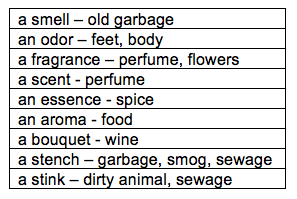Word Analysis Strategy: How to Convey Depth of Meaning
/For some people, writing is an arduous task. They would rather do anything but pay attention to and analyze words—especially when they are writing. But, it is possible to help writers learn how to analyze words in a fun way, intentionally, and with a goal in mind…being specific. Do you want your kids to write words that truly convey depth of meaning? Here’s one way to help them understand how.
On a lined piece of paper, draw a rectangular space like the example below. Then, starting at the top, begin with a word that has multiple synonyms. Words that have multiple synonyms are the culprits of generalization, after all, because you have to pick a specific synonym from a whole group of words that may or may not be swimming around in your brain at any given moment. Then, you have to make sure the word you pick makes sense in your sentence and accurately gets your meaning across.
As an example, I will use the word smell. See? Right off the bat, out of context, you don’t know if I am talking about how something smells or if I am referring to the act of smelling. So, back to my rectangle, I will enter the word smell on the top line—by the way, I am going for “how something smells.” Under that, I will begin to list all of the synonyms I can think of that mean about the same thing as “a smell.” Grabbing a thesaurus is a good plan right about now. Also, it helps to use an “a” or “an” in front to make sure you end up with a noun form. You can do this fairly easily with nouns, verbs, adverbs, and adjectives. In this case, I am sticking with nouns.
Check this out:
After each synonym, connect the specific words to other words that naturally seem to hover around those nouns. Then, talk about these words and how they can and should be used. Doing this exercise every once in a while with your learners can help them be more specific. Using the right words with the right words can clear up what they really want to say!





































































































